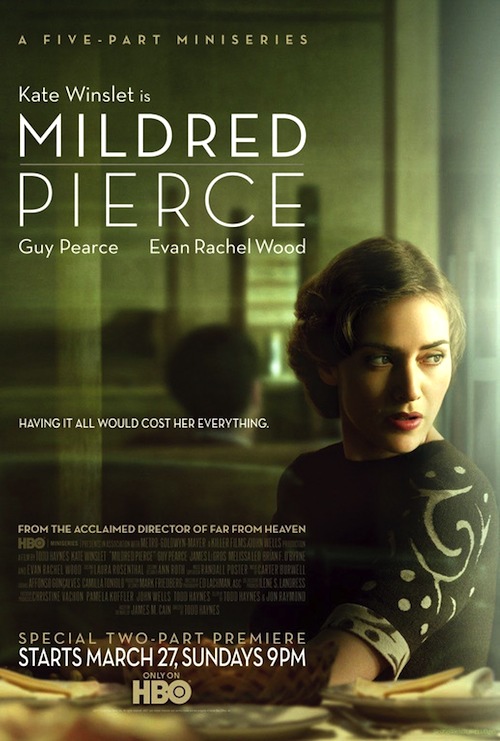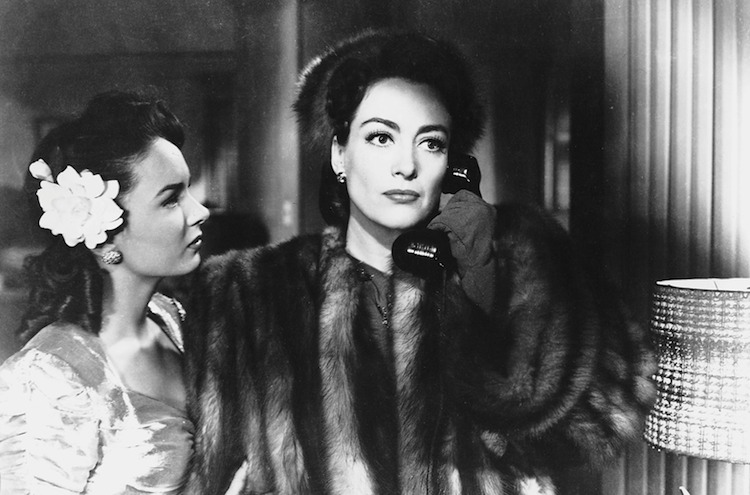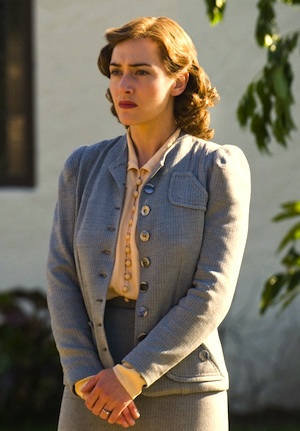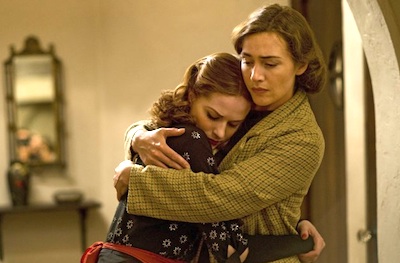 By Jennifer Baldwin. “About her face there was no distinction whatever. She was what is described as ‘nice-looking,’ rather than pretty; her own appraisal she sometimes gave in the phrase, ‘pass in a crowd.’ But this didn’t quite do her justice. Into her eyes, if she were provoked, or made fun of, or puzzled, there came a squint that was anything but alluring, that betrayed a rather appalling literal-mindedness, or matter-of-factness, or whatever it might be called, but that hinted, nevertheless, at something more than complete vacuity inside. It was the squint, Bert confessed afterwards, that first caught his fancy, and convinced him there was ‘something to her.’” – James M. Cain, Mildred Pierce (1941).
By Jennifer Baldwin. “About her face there was no distinction whatever. She was what is described as ‘nice-looking,’ rather than pretty; her own appraisal she sometimes gave in the phrase, ‘pass in a crowd.’ But this didn’t quite do her justice. Into her eyes, if she were provoked, or made fun of, or puzzled, there came a squint that was anything but alluring, that betrayed a rather appalling literal-mindedness, or matter-of-factness, or whatever it might be called, but that hinted, nevertheless, at something more than complete vacuity inside. It was the squint, Bert confessed afterwards, that first caught his fancy, and convinced him there was ‘something to her.’” – James M. Cain, Mildred Pierce (1941).
The squint in her eye is Mildred’s defining detail in James M. Cain’s novel, but in Todd Haynes’s (dir. Far From Heaven) beautifully detailed new adaptation, it’s the one detail that’s been left out. Meticulously rendered, obsessively detailed, HBO’s new five-part miniseries Mildred Pierce is a gorgeous and intoxicating recreation of Depression-era southern California. And Kate Winslet throws herself full-throttle into the part of Mildred, a recently divorced housewife and mother who does what she must in order to provide for her children, especially her snobbish, cruel elder daughter, Veda (Morgan Turner, Evan Rachel Wood). Winslet gives a naturalistic performance and her sobs and flashes of anger are neither histrionic nor mechanical, but instead subtle and filled with an inner intensity. She puts as much life into Mildred as she can and you can see Winslet’s skill at work in every frame (and she’s in almost every frame of the show). Unfortunately, seeing is not feeling, and I was left strangely cold by Winslet’s performance, despite being hypnotically sucked in by the luridness of the story and the sumptuousness of the set design.
Please note, I’m a devoted fan of the 1945 Michael Curtiz Mildred Pierce, but I’m also an admirer of Cain’s original novel, so I was thrilled by the prospect of a miniseries that played closer to the book. And Haynes’s version sticks to the book almost to the letter. I’ve always been fascinated by the process of adapting a book to the screen, how screenwriters and directors decide what to change, what to leave out, what to keep in, and how to condense a book of three hundred pages into a movie of two hours. Haynes and his co-writer have lifted entire scenes and passages of dialogue straight from the text, while the knock on Curtiz’s version was that it departed quite a bit from the book, in particular by adding a crucial murder-mystery subplot. But which is the “truer” adaptation? What counts in translating literature to cinema? Is it fidelity to the text itself or fidelity to the spirit of the text? Joan Crawford’s Mildred might not say as many lines from the book as Winslet’s Mildred does, but whose performance is truer to the Mildred character in spirit, Crawford’s or Winslet’s?

Having watched the first two episodes of the miniseries twice now, I’m still not sure of my answer. I liked this new version, and despite its deliberate start, I found myself slowly captivated by what feels like an authentic portrait of 1931 Glendale. But there was a distance between the characters and myself – Winslet’s character in particular – that I had never felt while watching the 1945 classic. Was Haynes’s dedication to the book and its dialogue sucking the life out of Cain’s characters? Cain himself, when commenting on Raymond Chandler’s adaptation of Double Indemnity, said that dialogue that works on the page doesn’t always work on the actor’s lips. I felt that was often the case in this latest version of Mildred Pierce.

Melissa Leo’s performance as Lucy Gessler, for instance, felt mannered and forced, and I lay the blame on the dialogue. In the book it works, but in the miniseries, it sounds too stylized, too cute, and yet it doesn’t have the feel of real speech. I’ve watched enough rat-ta-tat 1930s programmers to know what snappy, hard-boiled dialogue should sound and feel like, but Leo’s lines, while containing the necessary snap in terms of vocabulary and syntax, sounded overwrought and fake when spoken aloud. Veda’s lines, as well, were just too much to believe when given voice by an actor. On the pages of Cain’s novel, the insufferable snobbery and sly deceit comes through in the dialogue and it works. But when the lines are spoken in the miniseries, they become almost impossible to believe. Maybe that’s the point, maybe Haynes wanted to create an unrealistic and artificial Veda, but I was longing for the realism (yes, realism!) of Ann Blyth’s interpretation.
And really, Ann Blyth doesn’t get enough credit for her work in the 1945 film. Joan Crawford, of course, won an Oscar for her performance – and Jack Carson, Eve Arden, and Zachary Scott are all deliciously perfect in their supporting roles – but Blyth manages the tricky job of making Veda a believable monster. For one thing, she sells Veda’s haughtiness without making her into a caricature. But she also makes us understand why Mildred keeps spoiling and sacrificing for her. She’s just the right amount of feigned sweetness and barely contained contempt, the kind of daughter who can twist the knife into a devoted mother but flash the sweet smile while she does it. In the new miniseries, the deliciously haughty dialogue that Cain wrote freezes into artifice when spoken out loud, and it becomes hard to understand why Mildred would be so devoted to such a ridiculous brat. I never had that problem with Blyth’s Veda, even as she descends into a vicious, irredeemable schemer.
Which leads me back to Winslet’s Mildred and her missing squint. It’s not that Winslet doesn’t show Mildred’s determined side, or her angry side, or her confident side. But I’m beginning to think that the squint is something that can’t be conjured by an actor’s skill; it has to exist as a part of the actor herself, as some mystical, innate quality that is part of her essence and which can’t be faked or intellectualized. My take on the miniseries is probably closest to Dan Callahan’s at Slant Magazine:
Winslet’s acting is exactly like Haynes’s directing here: sensitive, intelligent, even downright brainy, but lacking wildness, risk, fire… A native, instinctive talent like Crawford or Cain goes for an effect and lets the meaning of the effect take care of itself… For calculated types like Haynes and Winslet, the meanings have to be all spelled out, so that finally this Mildred Pierce works on a dozen intellectual planes but never has the brio of a full-blooded melodrama where we might be able to discover something that hasn’t been planned.

And yet, for all my problems with the adaptation and with Mildred’s character, I really did find the miniseries, thus far, to be worthwhile. The Mildred-gets-a-job-as-a-waitress scene alone is worth it, just for Mare Winningham’s turn as Ida (she makes Cain’s dialogue snap and crackle) and the way Haynes puts the audience directly into that world of clattering dishes and diner chatter.
And it can’t be said enough: this is a handsome, sober, intelligent drama, the likes of which we don’t often see in movies or on television anymore. Mildred Pierce, after all, is a domestic drama, a story that focuses on so-called “women’s” issues of home, family, marriage, sexual morality, the struggles of working women, etc., so it’s always refreshing to see a classic women’s “melodrama” get the five-star treatment (instead of the Lifetime Movie Channel treatment).
And even if Haynes’s five hour miniseries feels overindulgent at times, I’m willing to indulge it simply because stories like this don’t seem to get told all that much anymore. And notice that it’s not a theatrical movie but a made-for-TV movie instead. Hollywood has all but abandoned the serious woman-focused drama in feature films. The most that women can get at the theater these days is a frantic, barely-funny romantic comedy. TV is where risks are being taken and stories with adult sensibilities are being told. I would much rather settle in with a flawed but still good series like Mildred Pierce than watch the thousandth variation of an CGI-smothered action-chick flick, like Sucker Punch. Over that adolescent emptiness, I’ll take a heaping serving of Mildred’s chicken and waffles any day.
Posted on March 31st, 2011 at 1:54pm.
Melissa Leo is great in Mildred Pierce! Kate Winslet is great in Mildred Pierce! Your preference for Joan Crawford is understandable, but misguided. Melissa Leo and Kate Winslet should form a partnership. Just as we have a “Joan and Melissa Show” on television, HBO should produce a “Kate and Melisssa Show.” It will have to be rated “TV-MA” since both Melissa and Kate are famous for using “language that would make a sailor blush. They should also agree to co-host the Oscar Telecast next year. ABC will have to hire physicians to monitor the hearts and blood pressure of its censors, but the ratings will soar!
Don, I agree, both actresses are great. My issues are more with the dialogue and the script than with the actresses. They are doing their best with what they’ve been given.
Joan Crawford was under rated as an actress. Nonetheless, it is nice to see well written material. Seems all the writers are doing TV. Heard that this series was actually done in NY, with some scenes done upstate. Sure evoked the feel of California…so good job by set designers!!
I admired Kate Winslet’s transformation to a thinner Depression era housewife, and those home made pies made me hungry… but this is “The Joy Luck Club” type “chick flick” with even a bigger dose of estrogen. OK, “woman issues”….so to balance out my state of mind, I will watch some high Clint Eastwood or John Wayne movies.
Joan Crawford is underrated these days, for sure. I blame Mommy Dearest. She wasn’t a great actress, but she wasn’t just the camp monster that so many seem to take her for these days. Crawford’s acting was very instinctual, and when given the right part, she could do things that simple “acting” couldn’t achieve.
And yeah, the set design, costuming, and art design in general on this miniseries are all fantastic. One of the things I loved about the series (and which really came to the fore in the last couple of episodes) was how it contrasted Glendale with Pasadena and all of the little hierarchies and snobberies of Los Angeles at that time.
I meant high testosterone…
Just an addendum to my original review:
Having finished the miniseries this past Sunday, I have to say, Winslet’s Mildred really grew on me. She’s still a little too “patrician” for the part, as I see it, and the long pensive stares and furrowed brows did seem endless at times — but I really connected with her performance in these later episodes, especially episode five. Perhaps it’s because Mildred finally snaps in this one, but for once I felt that emotional gut-punch I was hoping for. The final scene with Mildred and Bert is unbelievably well done, giving the whole story a haunting sense of tragedy that I never really got from the novel.
Speaking of Cain’s novel, the whole Veda-suddenly-becomes-a-world-class-coloratura-soprano is an unfortunate bit of unrealistic silliness that I was hoping the miniseries could improve upon, but the show pretty much played it by the book. It’s not a fatal flaw, but it’s kinda laughable and somewhat ruins what had been a fairly realistic story up to that point.
Overall, while not as entertaining and iconic as the Michael Curtiz Mildred Pierce, this new miniseries is still a powerful, well-made adaptation of the novel. It’s a lot like the situation with True Grit: two great movies based on a great cult classic. So it is with Mildred Pierce. This newest version of the story just means more cinematic pleasure for us to enjoy.